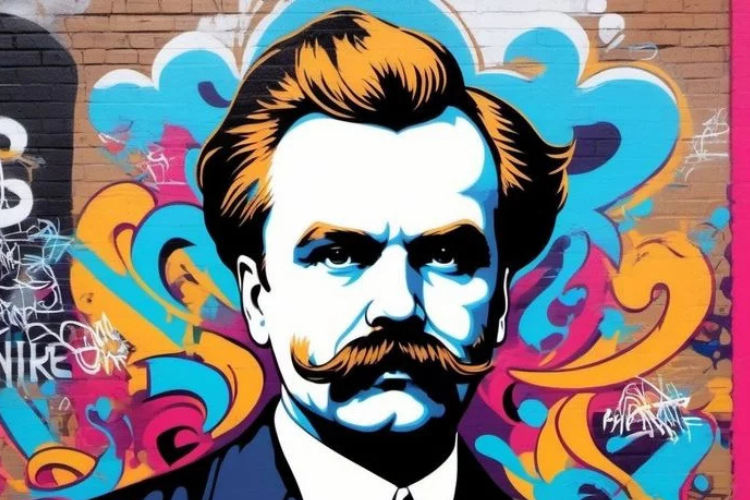Friedrich Nietzsche and the Übermensch
Friedrich Nietzsche, a prominent German philosopher of the 19th century, is renowned for his profound impact on modern philosophy and culture.
Born in 1844 in Röcken, Germany, Nietzsche was deeply influenced by the intellectual movements of his time.
Which included Romanticism, nihilism, and the emerging existentialist thought.
His critiques of religion, morality, and contemporary society laid the groundwork for much of his later work, which includes key concepts that continue to resonate today.
One of Nietzsche’s most significant contributions to philosophical discourse is the idea of the Übermensch, or “Overman.”
This concept, articulated in his seminal work “Thus Spoke Zarathustra,” represents an individual who transcends the conventional beliefs and morals that constrain humanity.
Rather than being defined by societal norms, the Übermensch embodies self-creation, embracing personal responsibility and the pursuit of one’s potential.
In doing so, this figure serves as a potent symbol of human empowerment, rejecting the limitations imposed by traditional dogmas and advocating for the assertion of individual will.
The philosophical climate in which Nietzsche wrote was rife with discussions around the decline of traditional religious values, the rise of science, and existential despair.
Many intellectuals were grappling with the implications of a world perceived to be devoid of inherent meaning.
Nietzsche addressed this challenge head-on by proclaiming the need for individuals to forge their destinies.
The Übermensch is not merely an ideal but a call to action, urging individuals to seek self-overcoming and embrace their innate potential.
Understanding Nietzsche’s philosophy of the Übermensch is vital for grasping the essence of personal empowerment.
His work encourages a departure from passive acceptance of life’s circumstances, pushing for a dynamic pursuit of one’s aspirations and identity.
This section establishes a foundation for exploring how Nietzsche’s thoughts resonate with contemporary discussions about self-improvement and empowerment.

The Core Principles of Friedrich Nietzsche Übermensch
Friedrich Nietzsche’s concept of the Übermensch, or “superman,” serves as a cornerstone of his philosophical ideals.
And presents transformative principles that can lead to personal empowerment.
One of the key elements within this framework is the “will to power,” which Nietzsche describes as a fundamental driving force in human beings.
Rather than merely seeking survival or reproduction, individuals are viewed as striving for dominance, achievement, and self-overcoming.
By embracing the will to power, one can actively shape their life.
Fostering a sense of agency and strength necessary to pursue their unique path and establish their personal values, thus allowing for heightened empowerment.
Another significant principle tied closely to the Übermensch is the idea of eternal recurrence.
Nietzsche posits this as a thought experiment that asks individuals to consider living their lives over again in precisely the same manner, ad infinitum.
This notion challenges people to evaluate their choices and actions, encouraging them to live authentically and fully commit to their existence.
By contemplating eternal recurrence, one is prompted to seek a life that reflects genuine aspirations and desires.
Achieving authenticity and enhancing personal empowerment through conscious decision-making.
Moreover, the Übermensch embodies the rejection of conventional morality imposed by society.
Nietzsche criticizes the traditional moral systems that prioritize conformity and mediocrity, arguing that these norms stifle individuality and creativity.
Instead, he advocates for the creation of one’s values and moral compass, thus promoting the power of self-determination.
By dismantling societal moral standards, individuals can liberate themselves from the chains of expectation, enabling a pursuit of their passions and desires.
This rejection fosters a deeper sense of empowerment, as it encourages individuals to embrace their true selves without succumbing to external pressures.
Practical Implications for Personal Empowerment
Nietzsche’s concept of the Übermensch serves as a profound source of inspiration for personal empowerment in contemporary life.
Embracing the essence of the Übermensch encourages individuals to transcend conventional boundaries and forge their distinct paths.
One practical application of this philosophy is the rejection of societal norms that can stifle personal growth.
By critically evaluating and questioning inherited beliefs, individuals can cultivate a personalized value system that resonates with their authentic selves.
Building resilience is another essential aspect of Nietzsche’s philosophy.
The notion of “Amor Fati,” or love of fate, underscores the importance of accepting life’s challenges and adversities as integral components of personal development.
By embracing difficulties rather than avoiding them, individuals can transform obstacles into opportunities for growth.
Practicing mindfulness and self-reflection aids in recognizing these challenges, allowing one to respond to them with strength instead of succumbing to despair.
Individuality is paramount in Nietzsche’s philosophy, promoting authenticity as a key to empowerment.
Individuals should cherish their unique traits and perspectives, enabling them to pursue excellence in their endeavors.
This can be achieved through setting personal goals that align with one’s values and passions, rather than conforming to societal expectations.
Engaging in creative pursuits or taking calculated risks fosters a sense of individuality and propels personal excellence.
Furthermore, the philosophies of Nietzsche advocate for a commitment to lifelong learning.
By acquiring new skills and knowledge, individuals broaden their horizons and enhance their capacities for self-empowerment.
Embracing a mindset of continuous growth and curiosity enables a deeper understanding of oneself and serves as a catalyst for personal transformation.
In essence, the practical implications of Nietzsche’s philosophy of the Übermensch inspire individuals to embrace resilience, individuality, and continuous growth on their journey toward personal empowerment.
Critiques and Misinterpretations of Friedrich Nietzsche’s Philosophy
Friedrich Nietzsche‘s philosophy, particularly the concept of the Übermensch, has often faced scrutiny and misinterpretation throughout history.
Critics have frequently labeled Nietzsche as a proponent of elitism and nihilism.
Claiming that the idea of the Übermensch endorses a form of superiority that justifies oppression or objectification of others.
This reading often overlooks Nietzsche’s intention behind the concept.
Reducing it to a mere expression of supremacy rather than as a pathway for individual growth and self-empowerment.
Furthermore, the historical misappropriation of Nietzsche’s philosophy, especially by fascist regimes, has led to a distorted understanding of the Übermensch.
Such misuse has been rooted in a superficial interpretation, emphasizing power dynamics rather than philosophical depth.
Nietzsche’s writings sought to challenge conventional norms and inspire individuals to transcend mediocrity.
A message fundamentally diverging from the ideals of dominance or prejudice.
His philosophical construct thrives on self-overcoming.
Urging individuals to confront their weaknesses and to aspire towards a higher state of being, characterized by creativity, authenticity, and resilience.
Additionally, critics often conflate the absence of an inherent meaning or absolute morality in Nietzsche’s work with nihilism.
However, Nietzsche proposed that individuals have the power to create their own values, encouraging personal accountability and active engagement with life’s challenges.
The Übermensch, in this light, embodies an ideal of human potential that resonates with the pursuit of personal transformation rather than the subjugation of others.
In conclusion, addressing these critiques and misinterpretations is essential for a nuanced understanding of Nietzsche’s philosophy.
By clarifying the purpose of the Übermensch as a symbol of growth and self-improvement.
We can better appreciate the profound relevance of Nietzsche’s ideas in today’s pursuit of personal empowerment and transformation.
The Friedrich Nietzsche Experience



